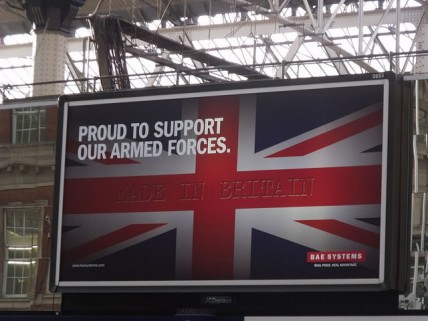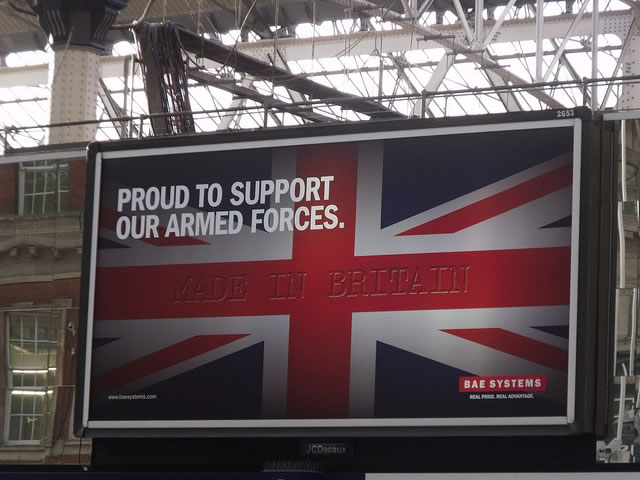
BAE Systems Union Jack Advertising Billboard. Photograph by Elliott Brown
The merger between BAE Systems and EADS is off, but would it have made any difference had it gone ahead? There might have been one significant change – a merged BAE and EADS would have made it more difficult for BAE to portray itself, when talking to a UK audience, as a “British” company with the UK’s interests at heart.
Contrary to this carefully cultivated image, BAE is in reality a company focussed on achieving profits for its global shareholders. It has five ‘home markets’ in Australia, India, Saudi Arabia, the UK and the USA. The last-mentioned contributed 47% of the company’s global sales in 2011, far the largest proportion. Fewer of the company’s employees are based in the UK than in the USA.
BAE does not have the UK’s security at heart
The 2010 National Security Strategy identified the top threats facing the UK as international terrorism, cyber attacks, a major accident or natural hazard (for instance, flooding or a flu pandemic), and an international military crisis into which the UK could be drawn. Despite this, lobbying by BAE and the other military companies as well as their friends in Government has left the UK committed to heavy expenditure on large items of military equipment. These include aircraft carriers, fighter aircraft and Trident. These purchases do not address today’s security challenges.
BAE and the other arms companies also enjoy the support of a dedicated Government arms sales unit, the UK Trade and Investment Defence and Security Organisation. Its approximately 150 staff are paid for by the UK taxpayer. The relationship between the UK government and BAE is particularly important to the Government’s massive arms contracts with Saudi Arabia. These are government-to-government deals between the UK and Saudi Arabia, with BAE then employed by the UK government as prime contractor. The Ministry of Defence Saudi Armed Forces Project (MODSAP) within the UK Ministry of Defence has around 200 staff, both military and civil, based in the UK and Saudi Arabia. The costs are met by the Saudi government, giving one of the world’s most authoritarian regimes a foothold in Whitehall.
This summer the House of Commons Committees on Arms Export Controls acknowledged the ‘inherent conflict between strongly promoting arms exports to authoritarian regimes whilst strongly criticising their lack of human rights at the same time.’ Perhaps the support given to authoritarian regimes by UK governments acting as arms sales reps might be examined more objectively if the link between BAE and “British” interests were questioned.
BAE does not prioritise UK jobs
Even many of those uneasy about the arms trade are reluctant to speak out because BAE and the other companies are commonly thought to provide lots of highly skilled employment. However, workers’ interests are not a top priority, as shown at BAE’s 2012 Annual General Meeting. BAE workers from Brough on Humberside, facing factory closure, were repeatedly told that global financial targets and the ‘long-term sustainability of the business’ were more important than their jobs.
A new direction
Several years ago the Financial Times observed: ‘Spending on defence is no better at creating jobs than support for other sectors. Defence R&D may produce spin-offs, but so too may R&D with civilian applications.’ The same point was made more recently with respect to the BAE-EADS merger talks and the huge amounts of money going to the arms industry. Matthew Lynn pointed out in MoneyWeek that: ‘True, it creates jobs. But any form of government spending creates jobs.’
Governments have chosen to allocate taxpayers’ money to supporting arms exports and production, and, in consequence, jobs in these fields. However, BAE’s desire to merge with EADS was an acknowledgement of the decline of military industry, and that the former made a mistake by concentrating its production on arms. The UK government could see the proposed merger as an opportunity to rethink its industrial support and subsidy—to move this from the problematic arms industry towards renewable energy technologies.
The introductory paragraph for a Jane’s conference on Energy, Environment, Defence and Security that took place in May 2011 commented: ‘The defense market worldwide is worth a trillion dollars annually. The energy and environmental market is worth at least eight times this amount. The former is set to contract as governments address the economic realities of the coming decade; the latter is set to expand exponentially, especially in the renewables arena.’ Ending government support for military exports and spending on prestige procurement projects would release resources to help other sectors that might be more efficient and innovative, more likely to grow rather than decline, and more likely to support secure employment.
Dr Sandy Wilson, the President of General Dynamics UK and also Vice President-Defence of A|D|S told the Commons’ Business, Innovation and Skills Committee on 8th September 2010 that: ‘… the skills that might be divested of a reducing defence industry do not just sit there waiting to come back. They will be mopped up by other industries that need such skills. We are talking about high-level systems engineering skills, which are often described as hen’s teeth. It is an area in which the country generally needs to invest more. You can think of the upsurge in nuclear and alternative energy as being two areas that would mop up those people almost immediately.’
The skills required for renewable technology are very similar to those in the arms sector, and there is an engineering skills shortage. According to BIS, 13th July 2011, ‘At present the demand for skilled engineers far exceeds supply.’ Since climate change and energy security are both major current threats, far greater than those massive military spending is aimed at addressing, it would seem to be a win-win situation to use the skills of current arms industry workers as well as those seeking employment to tackle these. This requires a redistribution of resources and support.
Transferring Government support to the renewal energy sector should bring other benefits to the UK. It will help provide energy security without the current reliance on authoritarian regimes, and reduce motivation for foreign military intervention to protect oil supplies. If the UK government does stop courting these the authoritarian rulers as potential arms purchasers, and condemns their human rights abuses, that in turn is likely to lessen the terrorist threat against the UK.
Ann Feltham is Parliamentary Co-ordinator for the Campaign Against Arms Trade (CAAT)




